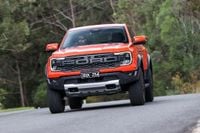Luxury car buyers in Australia could finally catch a break as the government weighs scrapping the long-debated Luxury Car Tax (LCT), a move that could drive down prices on premium vehicles like Mercedes-Benz, BMW, Audi, and more. The LCT, currently imposed at 33% on the portion of a vehicle’s value above $80,567 (or $91,387 for fuel-efficient models), may be axed as part of trade negotiations between Australia and the European Union. The Albanese Government is reportedly considering dropping the tax to secure better access for Australian agricultural exports into Europe, according to The Australian.
Originally introduced in 2001 to protect Australia’s now-defunct local car manufacturing industry, the LCT has remained in place despite Ford, Holden, and Toyota halting production in Australia by 2017. Over time, the tax has extended beyond luxury brands to impact popular mainstream models like the Toyota Prado and Hyundai Palisade, due to surging prices across the automotive market. With no local manufacturing left to shield, the tax has been increasingly viewed as outdated. Now, it could become a bargaining chip for Australia to improve trade ties with Europe.
Europe is feeling the squeeze from a flood of competitively priced Chinese-made vehicles, especially in the electric vehicle (EV) space. The influx has triggered a downturn in European EV sales, prompting Volkswagen Group and Audi to shutter plants, including the Brussels facility responsible for the now-defunct Q8 e-tron. European leaders, eager to revitalize their struggling automotive exports, are reportedly urging Australia to expedite trade discussions.
Removing the LCT, along with the 5% vehicle import duty, would make European cars more price-competitive in Australia. If the LCT is scrapped, buyers could see significant price cuts on a wide range of vehicles — not just ultra-luxury brands like Porsche and Lamborghini, but also premium SUVs and family cars that have crept past the tax threshold. Government data previously revealed that a major portion of LCT revenue — estimated at $1.2 billion annually — actually stems from Toyota sales, not luxury European brands, highlighting how widespread its impact has become.
However, while the LCT may be on its way out, a new cost factor is looming. The New Vehicle Efficiency Standard (NVES), set to be enforced from July 1, 2025, will penalize carmakers whose fleets exceed carbon emission targets. Automakers can offset emissions by selling EVs and low-emission vehicles — but if they miss the mark, fines could follow. Industry experts warn these penalties could trickle down to consumers in the form of higher vehicle prices, potentially offsetting the savings from a scrapped LCT.
The debate surrounding the Luxury Car Tax has intensified as the Albanese Government offers to scrap the A$5.2 billion tax to clinch a trade deal with the EU. From July 1, 2025, any car with a GST-inclusive value above the LCT threshold incurs a 33% tax on the excess amount. For the 2024–25 period, thresholds are set at A$91,387 for fuel-efficient vehicles and A$80,567 for all other vehicles.
Under the Treasury Laws Amendment (Tax Incentives and Integrity) Act 2025, the fuel-efficient threshold tightens from 7 L/100 km to 3.5 L/100 km. Only full EVs and plug-in hybrids now qualify for the higher A$91,387 threshold. All other hybrids and petrol cars face the lower A$80,567 limit, pushing more models into LCT territory. Shoppers targeting popular family hybrids—like the Toyota Kluger or Mazda CX-60—will find LCT added to their bill, potentially thousands of dollars more. Dealers must include LCT in the advertised price, squeezing margins or passing costs to buyers. A$45K vehicles that just cross the threshold incur no LCT, but stepping above by even A$1 triggers the full 33% on the excess.
A loophole exempts “commercial vehicles” (dual-cab utes) from LCT, costing taxpayers an estimated A$250 million annually. Wealthy tradies exploit this by registering luxury SUVs as commercial. Critics argue closing the loophole would curb high-emission ute sales without hurting genuine business users.
To win an EU free-trade pact, PM Albanese has offered to abolish LCT—if Europe opens its markets to Australian farmers. Success could wipe out the 33% levy, but only after lengthy negotiations. In the meantime, buyers should budget for higher costs from July 2025. Economists warn that scrapping LCT removes an incentive to buy greener cars, while critics say the current tax hampers EV uptake. Some propose shifting to a carbon-based vehicle tax, charging by CO₂ emissions rather than price. This could better align with Australia’s net-zero goals.
The push to axe the Luxury Car Tax could finally bring relief to Australian car buyers, slashing prices on a wide range of vehicles and giving European brands a needed edge. However, the benefits may be tempered by the rollout of NVES penalties, depending on how car manufacturers adapt. Still, after more than two decades of debate, the luxury car tax could soon become a thing of the past — and buyers may finally see the difference in their wallets.






